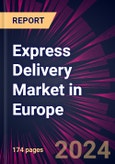Speak directly to the analyst to clarify any post sales queries you may have.
The report offers an up-to-date analysis regarding the current market scenario, the latest trends and drivers, and the overall market environment. The market is driven by growth of e-commerce industry in europe, growing use of express delivery services for pharmaceutical goods, and increase in cross-border trade within europe.
The express delivery market in europe is segmented as below:
By Application
- Domestic
- International
By Type
- B2B
- B2C
- C2C
By Geographical Landscape
- Europe
The report on the express delivery market in europe covers the following areas:
- Express Delivery Market in Europe sizing
- Express Delivery Market in Europe forecast
- Express Delivery Market in Europe industry analysis
The study was conducted using an objective combination of primary and secondary information including inputs from key participants in the industry. The report contains a comprehensive market and vendor landscape in addition to an analysis of the key vendors.
The report presents a detailed picture of the market by the way of study, synthesis, and summation of data from multiple sources by an analysis of key parameters such as profit, pricing, competition, and promotions. It presents various market facets by identifying the key industry influencers. The data presented is comprehensive, reliable, and a result of extensive primary and secondary research. The market research reports provide a complete competitive landscape and an in-depth vendor selection methodology and analysis using qualitative and quantitative research to forecast accurate market growth.
Table of Contents
Executive Summary
The following companies are recognized as the key players in the express delivery market in europe: AfterShip Group, Aramex International LLC, BTA International, Burns Express Freight Ltd., CMA CGM SA Group, DB Schenker, Deutsche Post AG, DHL Express Ltd., DPD Deutschland GmbH, DPEX Worldwide, FedEx Corp., International Distributions Services plc, La Poste SA, Manston Express Transport, Montad Ltd t a Cargo Express, Otto GmbH and Co. KG, POSTE ITALIANE SPA, PostNL N.V., Simpex, and United Parcel Service Inc..Commenting on the report, an analyst from the research team said: "The latest trend gaining momentum in the market is consolidation in express delivery market in europe."
According to the report, one of the major drivers for this market is the growth of e-commerce industry in europe.
The study was conducted using an objective combination of primary and secondary information including inputs from key participants in the industry. The report contains a comprehensive market and vendor landscape in addition to a SWOT analysis of the key vendors.
Companies Mentioned (Partial List)
A selection of companies mentioned in this report includes, but is not limited to:
- AfterShip Group
- Aramex International LLC
- BTA International
- Burns Express Freight Ltd.
- CMA CGM SA Group
- DB Schenker
- Deutsche Post AG
- DHL Express Ltd.
- DPD Deutschland GmbH
- DPEX Worldwide
- FedEx Corp.
- International Distributions Services plc
- La Poste SA
- Manston Express Transport
- Montad Ltd t a Cargo Express
- Otto GmbH and Co. KG
- POSTE ITALIANE SPA
- PostNL N.V.
- Simpex
- United Parcel Service Inc.








